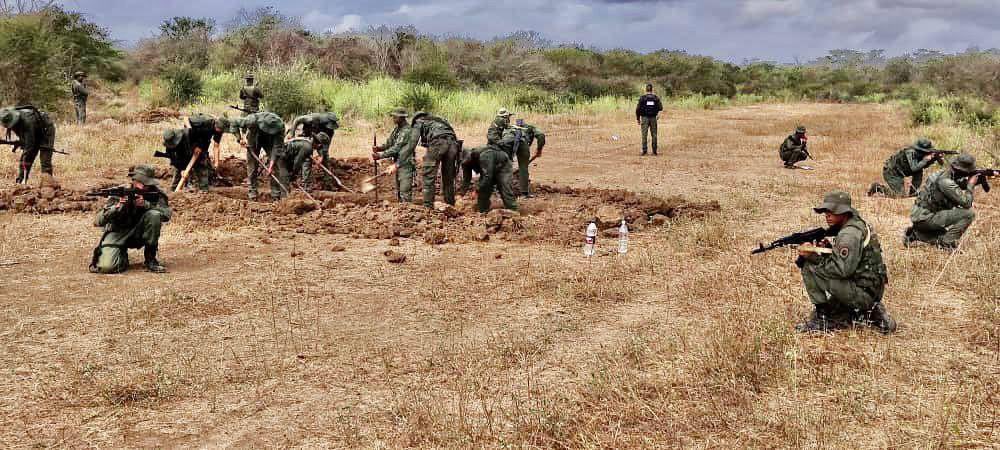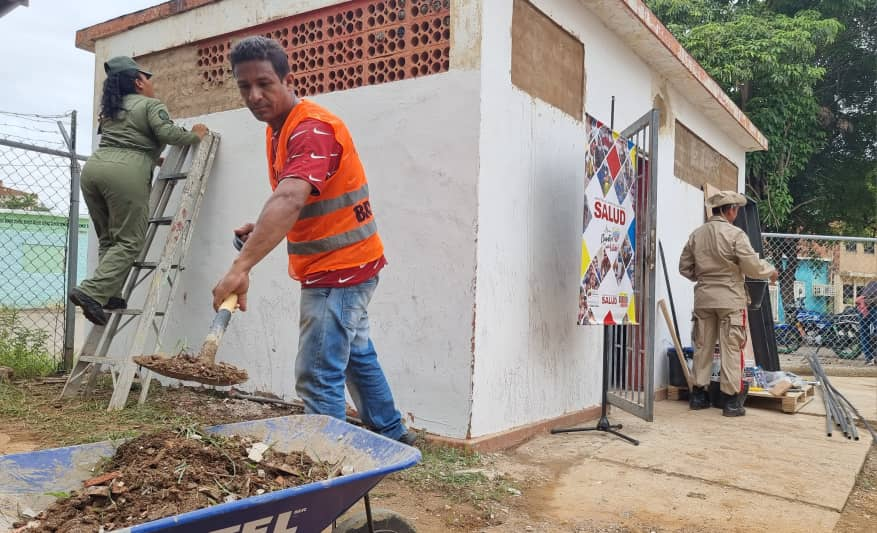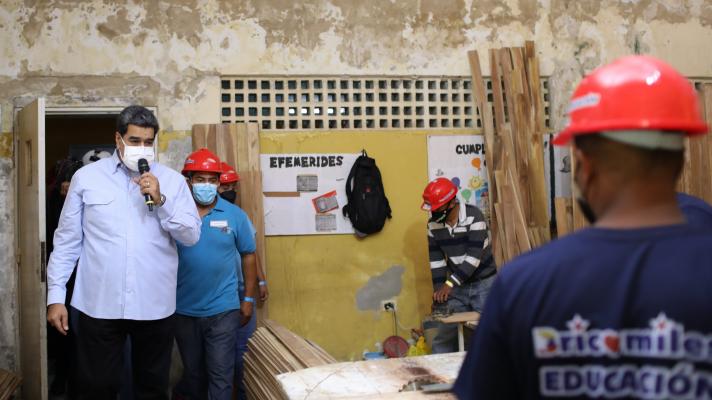Venezuela, a country for years under the US blockade, still manages to develop.
The Posadists Today reproduce below the article published in Spanish by Mision Verdad (an investigation and analysis group based in Caracas) and in French by the Venezuela Infos blog on 12.8.2023. Translation in English from the French by Posadists Today. The article is important in showing how Venezuela, a country for years under the US blockade, still manages to develop. It takes the measures essential to improve the quality of life for the population in the fields of the economy, education, health, food security, information and citizen participation. This gives to the population the means necessary to be central player in its own development and in the transformation of Venezuelan society.
********************************
For the past ten years, the Bolivarian government of Nicolas Maduro has faced aggression from the United States, the European Union and other satellite countries. The country’s response consists in implementing public policies tested by trial and error, in a context marked by the weaknesses of the petro-rentier socio-economic structure, combined and aggravated by the impact of the 927 “sanctions”, i.e. the unilateral coercive measures from the United States and the European Union.
Economy
As Rafael Correa reminded us, this economic war has caused the Venezuelan State to lose 99% of its resources, causing a population exodus. The blockade strategy against Venezuela consisted of closing the means to finance the economy, to prevent the entry of external resources, and therefore blocking the sovereign debt in US dollars. This deteriorated the value of the latter, prevented its negotiation and increased the risk for the country, which ended up scaring foreign capital away.
In addition, a process of sabotage of oil production was put in place, so that the receipt of dollars fell from 39 billion in 2014 to 743 million in 2020. In seven years, Venezuela lost 99 dollars out of each 100 that it received, according to the publication “Figures from the blockade (2014-2023), the Statistical Account of an Aggression” from the Venezuelan Anti-Blockade Observatory. And although there was a slight recovery since 2021, the 2022 revenues were only 10% of those received in 2015, the year when the implementation of the unilateral coercive measures began.
With these 927 measures taken against it, the country stands between fifth and sixth rank in the most sanctioned States in the world. The production of 3.995 billion barrels was prevented, and an estimated $232 billion in revenue was lost in the oil sector alone. This was stated by President Nicolás Maduro during the presentation of his 2023 annual report and accounts.
For non-oil activities, which involve capital investment and the purchase of raw materials, losses reached $642 billion, or an average of $411 million every day. After fine-tuning the strategies for the recovery of the economy, Venezuela has managed to achieve some progress:
- According to a report by the Organization of the Petroleum Exporting Countries (OPEC), Venezuela reached the highest crude oil production so far in 2023 last May: 819,000 barrels of crude oil per day. This figure is higher than the production averages obtained in 2021 and 2022.
- This year, economic growth in Venezuela will exceed 5.5%, according to CEPAL (UN) estimates.
- The country’s tourism sector grew by 25% in the year 2023.
- According to Global Scope, C.A., the financial assets and profits of Venezuelan banks increased by 31.24% at the end of May 2023.
- The total assets of the banking system stood at 209.40 billion bolivars, or about 8 million dollars, with a growth of 5.27% year-on-year.
- The executive director of the Venezuelan Chamber of Shopping Centers (Cavececo), Claudia Itriago, reported a 40% recovery in sales in the first half of 2023 compared to the first half of 2022.
- Exports to all of Latin America and the Caribbean increased by 63%.
Health and social protection
Venezuela has signed agreements with the Pan American Health Organization (PAHO) and the Vaccine Alliance (GAVI) to introduce vaccines against human papillomavirus (HPV), pneumococcal bacteria and rotavirus. These vaccines were previously part of the national immunization program, but they were excluded during the last six-year term due to international “sanctions” imposed on the country. HPV is the main cause of uterine cancer and one of the most common diseases in the country.
In the framework of the first Venezuelan conference on critical thinking in health and health sovereignty, the sectoral vice-president for science, technology, health and education, Gabriela Jiménez Ramírez, explained how, with the lack of access to vaccines and the blocking of payments to PAHO, attempts were made to return Venezuela to the critical health situation of 1930. “Venezuela was considered a country at risk, they began to impose conditions to other countries in the region, after plundering our resources and denying us access to the Pan American Vaccine Fund,” Jiménez said.
Other advances:
- The National Surgery Plan has enabled 107,68 surgical operations to be carried out by strengthening the national public health system and by rehabilitating and inaugurating health centres.
- The humanized birthing plan encourages the creation of a breast milk bank: it is a plan for the protection of mothers through circles of gestational support and a monthly bonus for the duration of the pregnancy and breastfeeding.
- According to the Chamber of the Pharmaceutical Industry, the national pharmaceutical market grew by 9.8% in the first five months of the year compared to the same period in 2022.
- 1.1 million doses of insulin arrived in Venezuela from Russia, as part of the agreement between the Russian company Geropharm and the Venezuelan company Espromed Bio.
Food security and sovereignty
The publication from the Venezuelan Anti-Blockade Observatory indicates that, since January 2017, several international financial institutions have refused to process a series of payment operations ordered by the Venezuelan government, some of them aimed at the National Seed Plan, which has affected food production. Other actions affected the acquisition of food subsidized by the Local Committees of Supply and Production (CLAP) program that year, and the following year, with the collaboration of the Colombian paramilitary government of the time. A crude-for-food trade route was even “sanctioned” against a group of Mexican businessmen in 2020.
The report presented by the Food and Agriculture Organization of the United Nations (FAO) entitled “Food security and nutrition in the world”, reveals that around 2 million people have emerged from undernourishment. Indeed, the undernourishment prevalence rate (SPI) fell from 24.9% in 2019 to 22.9% in 2022.
Other progress: The Campo Soberano fairs ended the month of July with more than 15,000 tonnes distributed, a figure that exceeds the target set by the Food Mission. Venezuela planted 360,000 hectares of cereals, equivalent to 47.99% of production, an increase of 47.9% compared to the same period in 2022. Progress in national seed production should guarantee planting by 2024. The Local Supply and Production Committees (CLAP) – grassroots organizations for the distribution of food donated by the government – serve 7 million 500 thousand families at least once a month, and their products now exceed 95% of national production.
National Security and Defence
Western unilateral coercive measures have sought to disassemble the Venezuelan State, in particular the integrity of its territory. A project of slow aggression was thus developed, the main axis of which was the presence of the so-called Colombian Armed Terrorist Groups of Drug Traffickers (Tancol), armed criminal structures that operated in the border areas as well as in urban centers.
The West sought to weaken national defence through assassination attempts, coups and invasions with mercenaries, as well as to consolidate the air, land and sea routes for drug trafficking in Venezuela. Illegal mining has been spurred by international market demand for precious minerals such as gold and diamonds, which has harmed natural areas in the Venezuelan Amazon.

The Venezuelan army disables landing strips to stop them being used by drug traffickers.
Thanks to the action of the Bolivarian National Armed Forces (FANB) and Operation Autana, 7,613 illegal miners were evacuated last July from the Yapacana National Park, in the state of Amazonas. In addition, 24 tons of drugs have been seized so far in 2023 and 8,931 people have been arrested in connection with the fight against these illicit substances. The FANB has taken down 35 planes associated with drug trafficking since the start of the year.
The Public Ministry announced that since 2017, Venezuelan authorities have seized 214.5 tons of narcotics, deprived 8,160 people of their liberty and obtained 12,030 convictions in the fight against drugs.
Vehicle thefts in the country have decreased by 22.5% and 92 people linked to this crime have been arrested. Kidnappings have also decreased by more than 50% in the country.
Infrastructure, services and telecommunications
Considering the impact of unilateral coercive measures on the education system and the national infrastructure, President Nicolás Maduro announced in June 2022 the creation of the Civic-Military Union Teams for Education and Health (Bricomiles) tasked with providing basic services such as education, water and health to help the recovery of infrastructure in educational and health care centers in the national territory.
Since 2021, the United Nations Special Rapporteur, Alena Douhan, has reiterated her call for the lifting of “sanctions” against Venezuela through a report in which, among other impacts, she denounces the way in which the limited financial resources of the government, to buy and repair necessary infrastructure, led to a reduction in Internet coverage, with only 10% of the territory having access to the service; before the coercive measures, the range was 50% to 90%.
Among the achievements are:
- A total of 27,000 educational centers have been rehabilitated by these Bricomiles throughout the national territory since its implementation in June 2022; In Caracas alone, more than 76% of the city’s campuses have been recovered. Last May, the Bricomiles had tackled 789 health spaces for their recovery, in particular: integral diagnostic centers (CDI), popular clinics (CP), community pharmacies, specialized high technology centers (CAT), rehabilitation centers, outpatient clinics and hospital services.

The Bricomiles have rehabilitated 789 spaces for use by Health Services
- Cantv (the public telephone company) is extending its Internet services using Gigabit Passive Optical Network (GPON) technology, a telecommunications access platform that uses optical fiber to reach the end user with 60 megabytes, and soon with 100, 200 and 300 megabytes.
- The rescue and conservation of Lake Maracaibo has been outlined with the undertaking of 10 lines of action.
Governance and Rule of Law
Along with the implementation of unilateral coercive measures, the “Guaidó project” functioned in synergy to create a parallel State based on the refusal of the National Assembly – with a right-wing majority elected in 2015 (AN-2015) – to recognize the other branches of powers. The ongoing threat of social chaos, whose paroxysm culminated in far-right street violence in 2017 (rebranded as “popular revolts” by international media), plus the inability of the AN-2015 to fulfil its functions and the financial weakness of the State, have made difficult the action of several services: either for lack of resources, or because some members joined in conspiratorial actions. Re-institutionalization returned through the electoral process through President Maduro’s convening of a National Constituent Assembly (2017) and presidential election (2018). And then, through the election of the National Assembly (2020), as well as the municipal and regional processes (2021).
Some achievements:
The Venezuelan legislature produced 11 laws so far in 2023, and from 2021 to date it created 70 legal bodies. The parliament has also set out to investigate the consequences of Donald Trump’s statements regarding the real targeting of Venezuela by the United States, particularly those who obeyed his orders, and the orders of other representatives in foreign governments.
Since 2018, the MPs (deputies) filed 1,208 femicide charges and 340 arrest warrants have been sought. Also, 10,430 people were indicted for crimes of sexual abuse of children and adolescents, 10,325 were charged and 3,721 were convicted. Out of 566 bullying cases, 207 teenagers were charged and 37 convicted.
Against bureaucracy: 1×10 of good governance
Since its launch and until the end of 2022, more than 87% of complaints filed under the “1×10” system of good governance (online platform for collecting complaints from citizens) have been processed. Last May, almost a year after the introduction of this system of social management system, President Maduro said: “In one year, we have managed to eliminate the cobwebs of bureaucracy, we have succeeded in creating a new dynamic of listening, caring and solving the problems of folks, of communities, of our people”.
President Maduro added that the success of such a methodology – whose priorities are services like gas, electricity and telecommunications – comes down to a direct management with the communities: “It is about converting our citizens, in a direct way, as protagonists in the construction of solutions to the vital problems encountered by the communities”.
In short, faced with all the challenges that arise, the Bolivarian government seeks to confront the blockade with different strategies that stabilize governability and provide a certain stability. This enables economic growth and guarantees the fundamental rights of the population – political, economic, social. , etc.
Article published by Venezuela Infos on August 12, 2023 –
Source: https://www.misionverdad.com/venezuela/gobernando-en-tiempos-de-bloqueo
Featured photo: President Nicolás Maduro proposes to “eliminate the cobwebs of bureaucracy” through programs like the “1×10 of Good Governance” (an online platform to collect complaints from citizens) as well as through civic-military unit teams and the “Bricomiles”[1]– Photo FANB
URL of this article: https://venezuelainfos.wordpress.com/2023/08/12/eliminer-les-toiles-daraignee-de-la-bureaucratie-comment-travaille-le-gouvernement-maduro-en-temps-de -blockade/
[1] The Bricolmiles are ‘Community-Military-Brigades’. The Maduro’s government created them in June 2022 to repair and refurbish the country’s public schools and Health Centres.
















